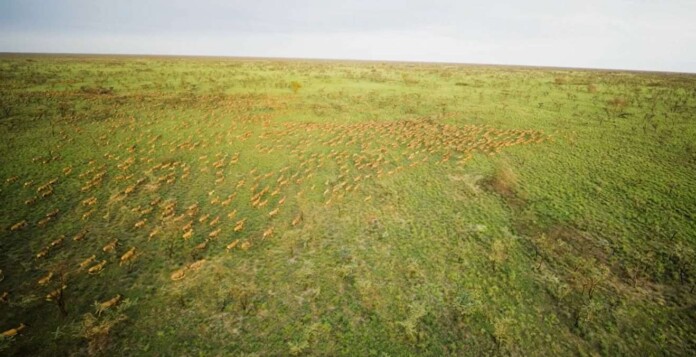“The greatest conservation opportunity on the planet” isn’t in the Amazon, the Andes, or Australia—it’s in South Sudan.
In an incredible revelation that underscores how much remains unexplored, the largest land mammal migration on Earth has been identified in South Sudan, prompting swift action from the government and African Parks to protect it.
Ecologists have known about the migration through South Sudan’s “No Man’s Land,” but its mechanics and scale were unclear. Unlike the well-known migrations of caribou in Canada or wildebeest in Kenya, this region hosts diverse species, including Mongalla gazelle, bohor reedbuck, white-eared kob, and tiang—all antelopes.
Recognizing the immense conservation potential, African Parks and the Republic of South Sudan have signed a 10-year agreement to manage this migration corridor within Boma National Park and Bandingilo National Park. This area spans 12,700 square miles, four times the size of Yellowstone.
Remarkably, the 20-year civil war between Sudan and South Sudan largely spared this vast region, preserving its ecological integrity.
To initiate effective management, African Parks launched the largest GPS collaring survey of large animals ever, tracking 12 species with 126 GPS devices. Alongside aerial surveys and input from 17 local ethnic groups, they began decoding the migration patterns. The antelopes travel in a wide circle, adjusting their path to follow rainfall.
“We flew for the first 30 to 40 minutes, and we didn’t see anything. I was like, ‘Oh, no, maybe it’s over. Maybe the wildlife has already disappeared,’” recounted David Simpson, park manager for African Parks, to ABC News. “Then we start seeing one, two, three, four. Then we start seeing hundreds and then thousands, and eventually tens of thousands, then hundreds of thousands.”
For the indigenous communities, this migration symbolizes natural abundance and balance. They depend on these animals for food, clothing, medicine, and shelter.
To support their traditional lifestyles while conserving the ecosystem, African Parks has engaged local people in educational and conservation efforts, ensuring the preservation of this extraordinary natural phenomenon.
